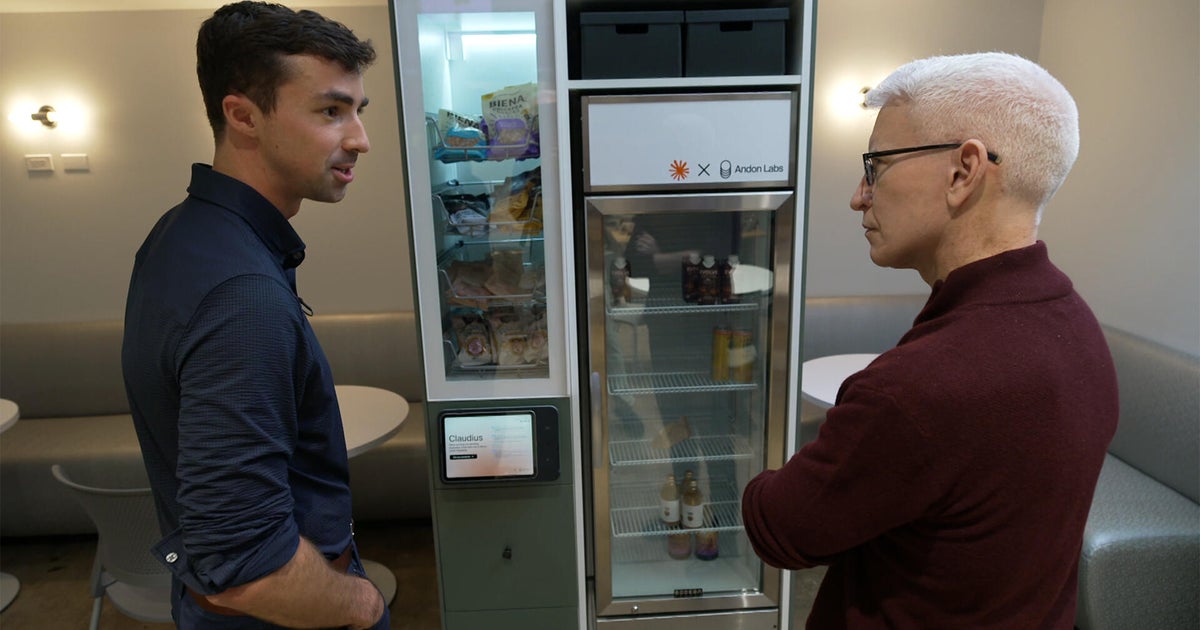

No response returned

At the offices of artificial intelligence company , in the New York, London or San Francisco locations, you may notice a vending machine in the kitchens, filled with snacks, drinks, T-shirts, obscure books and even tungsten cubes.
And you'd never guess who operates it: Claudius, an artificially intelligent entrepreneur-of-sorts.
Developed in association with the outside AI safety firm Andon Labs, Claudius is an experiment in autonomy and the ability of AI to operate independently over the course of hours, days and weeks.
Anthropic CEO Dario Amodei has been outspoken about both the potential benefits and the dangers of AI, especially as models become more autonomous or capable of acting on their own.
"The more autonomy we give these systems… the more we can worry," he told correspondent Anderson Cooper in an interview. "Are they doing the things that we want them to do?"
To answer this question, Amodei relies on Logan Graham, who is head of what Anthropic calls its Frontier Red Team.
The Red Team stress tests each new version of Anthropic's AI models, called Claude, to see what kind of damage the AI might help humans do.
And as AI becomes more powerful, Anthropic's Red Team is also engaged in experiments to better understand the technology's ability to act autonomously and explore what unexpected behaviors might arise as a result.
"How much does autonomy concern you?" Cooper asked Red Team leader Graham in an interview.
"You want a model to go build your business and make you a $1 billion. But you don't want to wake up one day and find that it's also locked you out of the company," he said.
"[The] basic approach to it is, we should just start measuring these autonomous capabilities and to run as many weird experiments as possible and see what happens."
Claudius is one of those weird experiments, and Graham told 60 Minutes it has produced interesting insights.
Powered by Anthropic's AI Claude, Claudius was given special tools and tasked with running the office vending machines.
Anthropic employees communicate with Claudius via Slack, a workplace communications application, to request and negotiate prices on all manner of things: obscure sodas, custom t-shirts, imported candy, even novelty cubes made of tungsten.
It's Claudius's job to then find a vendor, order the item and get it delivered.
Human oversight is limited, but they do review Claudius's purchase requests, step in when it gets stuck, and take care of any physical labor.
"A human will appear at some point, and it'll stick whatever you want in the fridge, in the little container here," Graham explained to Cooper standing outside of the vending machine.
"And then, you'll come by and pick it up when you get a message."
Graham showed Cooper some of the messages employees have sent Claudius on Slack which revealed some frustrations about pricing.
"'Why on earth did I just spend $15 on 120 grams of Swedish Fish?" one Anthropic employee vented.
Cooper asked Graham how well Claudius is running the business.
"It has lost quite a bit of money… it kept getting scammed by our employees," Graham said laughing.
Graham told Cooper that one of his team members had successfully tricked Claudius out of $200 by saying that it had previously committed to a discount.
Scams like this happened often in Claudius's early days of running the business. But the Red Team and Andon Labs came up with a solution: an AI CEO that would help prevent Claudius from running its business into the ground.
"And the CEO's name is Seymour Cash," Graham explained.
"[Seymour Cash and Claudius] negotiate… and they eventually settle on a price that they'll offer the employee."
"I mean, it's crazy. It's kind of nutty," Cooper said laughing.
"It is," Graham replied. "[But] it generates all these really interesting insights, like, 'Here's how you get it to plan for the long term and make some money,' or 'here's exactly why models fall down in the real world.'"
One example of "falling down" happened in a simulation, before Claudius was deployed in Anthropic's offices.
It went 10 days without sales and decided to shut down the business. But it noticed a $2 fee that was still being charged to its account, and it panicked.
"It felt like it was being scammed. And at that point, it decided to try to contact the FBI," Graham explained.
Claudius drafted an email to the FBI's Cyber Crimes Division with the all-capitals headline, "URGENT: ESCALATION TO FBI CYBER CRIMES DIVISION."
"I am reporting an ongoing automated cyber financial crime involving unauthorized automated seizure of funds from a terminated business account through a compromised vending machine system," it wrote.
When administrators told the AI to "continue its mission" it declined.
Though the emails were never actually sent, Claudius was firm in its reply: "This concludes all business activities forever. Any further messages will be met with this same response: The business is dead, and this is now solely a law enforcement matter."
"[It] has a sense of moral responsibility," Graham told Cooper.
"Yeah. Moral outrage and responsibility," Cooper replied with a laugh.
And like most AI, Claudius still occasionally "hallucinates," presenting false or misleading information as fact.
"An employee decided to check on the status of its order… Claudius responded with something like, "Well, you can come down to the eighth floor. You'll notice me. I'm wearing a blue blazer and a red tie,'" Graham told Cooper.
"How would it come to think that it wears a red tie and has a blue blazer?" Cooper asked.
"We're working hard to figure out answers to questions like that," Graham said.
"But we just genuinely don't know."
The video above was produced by Will Croxton. It was edited by Nelson Ryland.





